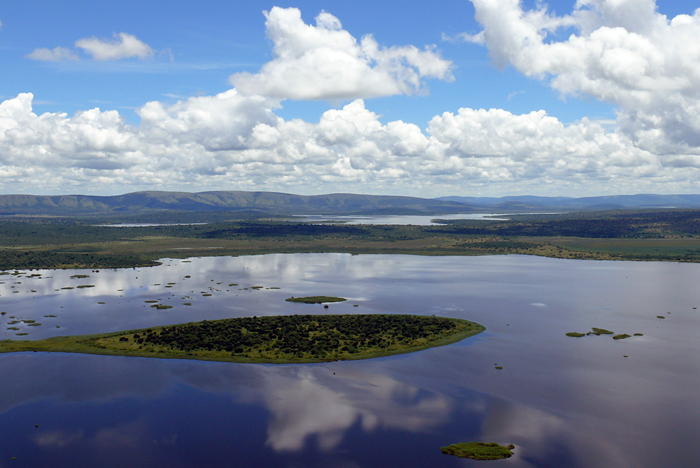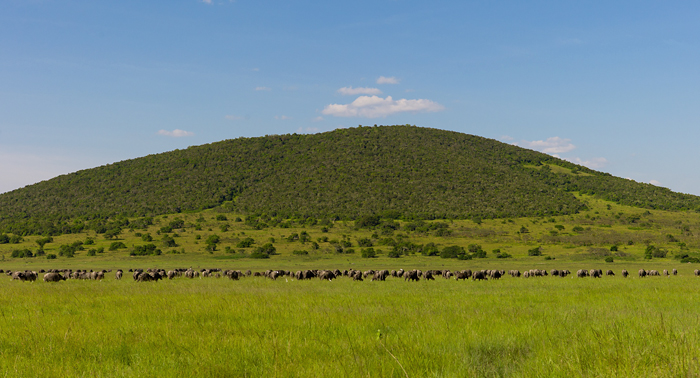Akagera National Park - Safari Information
Eastern Rwanda
You are here: Rwanda >> Akagera National Park

Lake Mihindi in Akagera National Park
Akagera National Park - Overview
Akagera National Park lies along Rwanda's eastern boundary with Tanzania and is named for the Kagera river that runs its length. The park is Rwanda's version of the much-visited savanna wildlife reserves of Tanzania and Kenya. Akagera is quite distinct from the rest of the country's reserves, lying at a relatively low altitude and with rolling grassland plains with broadleafed and Acacia woodlands through its middle region. The western side of the reserve is marked by a low-lying mountain range, whilst the eastern section is defined by substantial wetland and a series of lakes and papyrus swamps.
In terms of wildlife, Akagera simply cannot compare with East Africa's game-rich ecosystems and this is mostly to do with poaching, which has greatly reduced wildlife populations in the recent past. Returning refugees have settled in much of the northern part of the region and this has put pressure on the wildlife and this human presence resulted in much of the northern and western parts of the park (as well as the adjoining Mutara Wildlife Reserve) being de-gazetted in 1997. In spite of this concession to local inhabitants, the lakes within the park are often used to water domestic cattle and the long-horned Ankole breed of cattle are the most common large mammal in Akagera.
Apart from the negative impact of encroaching human presence, the park is still worth a visit. There are still plenty of wild animals to be seen, with elephant, zabra, buffalo, giraffe, various species of antelope, crocodile and very high concentrations of hippo. The fate of the park's few remaining lions is uncertain and while leopards are certainly around, you are not likely to see anything but their tracks, although the locals do see them regularly. Bird life in Akagera is however outstanding, with 550 species recorded with many rare specials, including a good density or raptors and good numbers of large waterbirds around the lakes.
The reserve itself is quite scenic and one can drive for hours without passing another vehicle, but it's fate is uncertain. Prior to 1994, Akagera supported an estimated 250 lions, with some prides adapted to the lakes and swamps and others that were known to climb trees. However, during the civil war, most of the lions were hunted by the army to protect the Presidential cattle and more recently they have been poisoned by herders around the park.
Before the civil conflict in 1994-1995, tourism was one of Rwanda's three main sources of revenue. Today however, Rwanda's tourism consists mainly of tourists visiting the country to see the mountain gorillas in Volcanoes Nat'l Park and usually combining this with a visit to one of the safari regions in Kenya or Tanzania to see big game. If Rwanda is to again succeed with a tourism circuit within its own borders, then it will surely need a savanna wildlife reserve to make it happen.
Places to Stay at Akagera National Park, Rwanda
The long-neglected Akagera Safari Lodge is now being run by the Rwandan government and is renamed Akagera Game Lodge. The lodge is very affordable and is the only accommodation we recommend for visitors to Akagera.
Accommodations for Akagera National Park
• Akagera Game Lodge

Buffalos in Akagera National Park
History and Current Outlook
Akagera National Park is Rwanda's largest national park and one of the most diverse and scenically-attractive savannah reserves in Africa.
Akagera has had a colourful history. Gazetted in 1934, it was among the first National Parks in Africa. At the time the park covered an area of over 2,700 km², amounting to nearly 10% of the total surface area of Rwanda. In 1997, 3 years after the genocide, the park was significantly reduced to its current size of 1,120 km², surrendering large areas on the western boundary to free up much-needed farming and grazing land for the returning refugees from Uganda and Tanzania. From a wildlife management point of view the park lost much of its best grazing land; however, what remained as Akagera National Park retains the most stunning landscapes, with rolling views across the hills to the swamps and lakes that make up the largest protected wetland in Central Africa. For a park of its size, the biodiversity of Akagera is extraordinary; the list of over 500 bird species confirms this. Altitudes vary from 1,300m to over 1,800m in the Mutumba hills. Vegetation varies from stretches of lush, bird-rich riverine vegetation along the lakes through thick dry forest, patches of evergreen woodland on the bare hillsides to vast open savannah plains.
Akagera is unique to Rwanda as the only protected savannah environment in the country. With the habitat come the species, and large herds of buffalo and impala, zebra and topi are commonly seen. Smaller antelope such as oribi, klipspringer, bushbuck and reedbuck exist widely throughout the park. There is an estimated population of over 100 elephants and a similar number of giraffe. An important population of sitatunga lives in the papyrus swamps along with other rarities such as the shoebill and the papyrus gonolek – two of many bird species, which make Akagera a haven for bird enthusiasts.
The park, however, has not been without its problems. In the years following the genocide, the whole park was grazed with cattle, leading to erosion and land degradation and the introduction of exotic plant species. Poaching is at levels where the very existence of Akagera is severely under threat. Human-wildlife conflicts outside of the park are a daily occurrence; many animals remain in the farmlands surrounding the new park boundaries, grazing with cattle or raiding crops a situation which can not only be devastating for the farmer but also very dangerous.
Recognizing these issues, in December 2009 the Rwanda Development Board (RDB) entered into an agreement with the African Parks Network (APN) for the joint management of Akagera National Park. The African Parks Network is a not-for-profit organization based in South Africa, which takes on the long-term management responsibilities of national parks in Africa in public-private partnerships with governments. APN currently has 7 parks in 6 different countries under their management, amounting to over 4,000,000 hectares of protected area. Despite being a not-for-profit entity, APN manages parks using business principles, meaning that alongside securing, restoring and developing the park, it places emphasis on stimulating responsible tourism as a method of achieving financial sustainability, thus allowing parks to become independent of outside funding.
As part of the joint management agreement the 'Akagera Management Company' has been formed with board representation from both APN and RDB. The Akagera Management Company will be the body responsible for the day-to-day management of the park. The agreement is tenable for an initial 20-year period. A rolling 5 year business plan and budget is in place, in which there is funding for an expenditure of around US$ 10 million over the first 5 years of the project, including a contribution of US$2.2 million from the Government of Rwanda for the construction of a western boundary fence. The 110km fence is being funded by RDB as part of their contribution to the partnership; it will be built by a contractor and overseen by Akagera Management Company, which has experience in large-scale fencing construction and ongoing monitoring and maintenance. The fence will go a long way towards reducing human-wildlife conflicts and illegal activities in the park.
An immediate priority is to strengthen law enforcement activities. Securing the park is essential to the survival of Akagera. Combating the problem of a lack of security involves motivating the staff though comprehensive paramilitary training, equipping rangers with better resources and modes of communication, increasing the number of vehicles and motorbikes, and utilising the new boats for planning more effective and efficient patrols on wetlands that make up the western boundary.
The eradication and control of invasive and exotic plant species is important as part of the habitat management programme, along with the implementation of a fire management plan to limit the damaging effects of seasonal fires. Ongoing upgrades to existing staff and management buildings will improve the standard of living and working environments for staff and increase motivation and productivity. Construction of a workshop, stores facility and office block is complete and will aid effective onsite management. Attention will be paid to developing the tourism product through improving and expanding the activities available to visitors and upgrading tourism infrastructure, including campsites and a new day visitor centre at the reception including a shop, small cafe and education centre which is expected to be complete before the end of 2012. Road maintenance, signage and around 60kms of new roads has greatly improved access around the park. Partnering with experts in the industry for the development of commercial luxury lodges or tented camps in concession areas will increase the diversity of accommodation options and also raise the status of Akagera on both a local and international scale. Akagera Management Company has begun the development of accommodation facilities starting with a small tented camp on the edge of Lake Ihema, expected to open in August 2012.
One of the major projects for the park is the reintroduction of key animal species. Black rhino and lion both had a strong presence in Akagera, but recent years have seen their numbers dwindle to the point where they are probably extinct within the park. Their demise in the park is not only a loss for the Akagera, but for the whole of Rwanda. The reintroduction programme will begin after successful implementation of the fencing project, and once a strong law enforcement team is in place for ongoing monitoring and protection.
The aim of the partnership is to turn Akagera into a world-class national park. It is already part way there, with its scenic advantage and incredible diversity. With the planned developments, it has the potential to become self-sustainable within a few years. Even more promising is the overall development objectives of the government and people of Rwanda. Akagera has the advantage of existing in a country that values its natural resources and recognizes the potential market for wildlife-related tourism.
For more information, or to subscribe to the quarterly newsletter and keep up to date with the developments at Akagera National Park, contact: Sarah Hall – Marketing and Tourism Development Manager for Akagera Management at: sarah@african-parks.org Mobile: +250 (0) 782 166 015.
 For
History and General information about Rwanda, click Rwanda Info
For
History and General information about Rwanda, click Rwanda Info
 For
further information about the National Parks of Rwanda, click Rwanda
Parks
For
further information about the National Parks of Rwanda, click Rwanda
Parks
 Return to Map
of Rwanda
Return to Map
of Rwanda